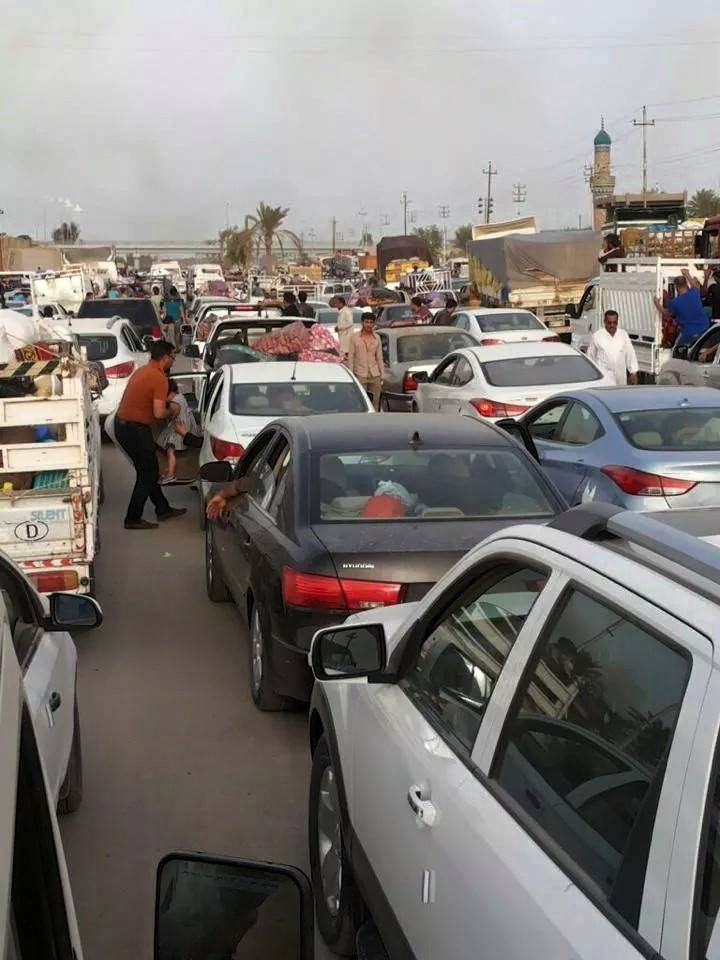BAGHDAD -- More than 2,000 families have fled the Iraqi city of Ramadi with little more than the clothes on their backs, officials said Thursday, as the Islamic State extremist group closed in on the capital of western Anbar province, clashing with Iraqi troops.
The extremist group, which has controlled the nearby city of Fallujah for more than a year, captured three villages on Ramadi's eastern outskirts Wednesday.
The advance is widely seen as a counteroffensive after the Islamic State lost Tikrit, Saddam Hussein's hometown, earlier this month.
Hundreds of U.S. troops are training Iraqi forces at the Ain al-Asad air base, about 70 miles west of Ramadi, but a U.S. military official said the fighting had no effect on the U.S. soldiers there and that there were no plans to withdraw them. Since January, hundreds of U.S. forces have been training Iraqi troops at the base.
The fleeing Ramadi residents were settling in the southern and western suburbs of Baghdad, and tents, food and other aid were being sent to them, said Sattar Nowruz, an official of the Ministry of Migration and the Displaced.
The ministry was assessing the situation with the provincial government "to provide the displaced people, who are undergoing difficult conditions, with better services and help," Nowruz said.
Sporadic clashes continued Thursday, security officials in Ramadi said. Government forces control the city center, while the Islamic State has had a presence in the suburbs and outskirts for months. They described Ramadi as a ghost town, with empty streets and closed shops.
Video obtained by The Associated Press showed plumes of thick, black smoke billowing above the city as fighter jets pounded militant targets. On the city's outskirts, displaced residents frantically tried to make their way out under heavy bombardment.
U.S.-led coalition airstrikes targeted the Islamic State in Sjariyah, Albu-Ghanim and Soufiya, the three villages the extremists captured Wednesday, the officials said.
They spoke on condition of anonymity because they were not allowed to talk to the media.
Anbar's deputy governor, Faleh al-Issawi, described the situation in Ramadi as "catastrophic" and urged the central government to send in reinforcements.
"We urge the Baghdad government to supply us immediately with troops and weapons in order to help us prevent the city from falling into the hands of the IS group," he said, referring to the Islamic State by its initials.
Stephane Dujarric, the spokesman for United Nations Secretary-General Ban Ki-moon, said access to the city was limited but that humanitarian workers were trying to verify the reports of fleeing residents.
Before the current fighting, around 400,000 Iraqis already were displaced, including 60,000 in the Ramadi district, according to the International Organization for Migration.
Al-Bayan, the Islamic State's English-language radio station, claimed the extremists had seized control of at least six areas and most of a seventh to the east of Ramadi since Wednesday, according to the SITE Intelligence Group, which monitors militant websites.
Al-Bayan also reported that an attempt by Iraqi troops to advance on the Beiji oil refinery in Salahuddin province, about 115 miles north of Baghdad, was pushed back and that fighters "positioned themselves in multiple parts of the refinery after taking control of most of it," according to SITE.
Iraqi officials could not be reached for comment on the fighting around Beiji. On Monday, Oil Minister Adel Abdul-Mahdi said Iraqi forces, backed by U.S.-led coalition airstrikes, had repelled an attack on Beiji over the weekend.
Information for this article was contributed by Sinan Salaheddin, Vivian Salama and Cara Anna of The Associated Press.
A Section on 04/17/2015

